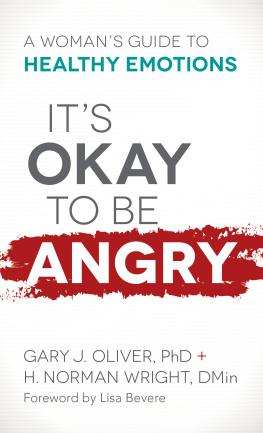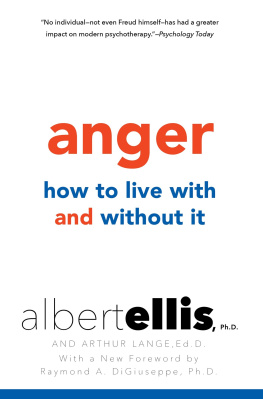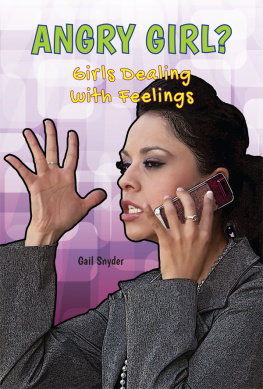Dont Let Anger Control You
Your face feels hot, your muscles tightenyou are angry and you dont know what to do about it. An Angry Guys Guide: How to Deal discusses the biological, emotional, and social effects of anger and provides research-based information about getting support and coping with it. Take a quiz to figure out if you are aggressive, passive, or assertive, and take the first steps to improve how you deal with anger.

This morning, Dereks older brother Kyle said hed pick Derek up after basketball practice, around 4:30 p.m. Practice ended on time, and soon afterward, Derek was outside the school, wishing his brother hadnt insisted that he wait outdoors. It was freezing and he didnt have his jacket.
Twenty minutes later, Kyles car finally pulled up to the curb. Shivering in the cold, Derek swung the car door open, shouting angrily, What took you so long? Its freezing out here. Where were you? Derek realized he was breathing fast and his clenched hands were shaking.
Everybody gets angry at one time or another. And Derek was no exception. He was so angry at his brother for keeping him waiting that he started yelling as soon as he got in the car.
Anger is a common human emotionits a normal response when you feel something has hurt or threatened you. Anger makes you feel like you have to do somethingand fast. When you feel angry you may feel like you have to break something or yell about the situation or shove the person bugging you. But these ways of showing anger often create more problems. Youve made other people angry with you. And afterward, you are likely to feel pretty rotten about your harmful words or actions.
When you are angry, your body becomes agitated and energized. Your blood pressure rises. Your heart beats faster. Your body temperature rises, so you start sweating. Your breathing becomes heavier and more rapid. Your muscles become tense.
All these symptoms of anger are part of your bodys protective response to threat or danger. The body feels strong and ready for action, or better able to physically defend itself. Anger prepares us for action, explains psychology researcher Carroll E. Izard. It bolsters physical strength and courage to match the impulse to act. We may never feel stronger or more invigorated than when we are really angry.
The strong man is not the good wrestler; the strong man is only the one who controls himself when he is angry.
The Prophet Muhammad
This feeling of being ready to stand and fightor to run awaydates back to prehistoric times. Known as the fight-or-flight instinct, it allowed primitive people to confront and survive dangers from wild animals and other threats. Although you dont typically need to defend yourself from wild animals today, your body still responds the same way whenever you feel threatened or uncomfortable.
You may feel angry when you are unsure of how to react in a confusing situation. Your anger may be prompted by a threat from another person, or if you feel someone did something to hurt you. You may feel angry because you did poorly on a test or in a game. Anger is a normal response to when you believe a friend has let you down. It can also be a reaction to injustice, fear, or feeling out of control.
An angry response is more likely to happen whenever youre feeling overwhelmed by other emotions such as disappointment, grief, or fear. In the same way, stressa feeling of emotional strain caused by demanding circumstancescan also lead to anger. For example, suppose you may have a fast-approaching homework assignment, and youre feeling stressed over having to meet the deadline. You may be angry at yourself for not getting the work done earlier. Or you may direct your anger at your friends who knew you had the assignment but talked you into going to the movies instead of working on it. Or you may feel angry with the teacher for assigning the project in the first place.
Anger is that powerful internal force that blows out the light of reason.
Ralph Waldo Emerson
Anger can be a good thing if it helps give you the confidence to assert yourself in a stressful situation or if someone threatens you or puts you down. However, the way that you express yourself when angry is important. Most people learn to deal with their anger and calm down within a few seconds or minutes. But sometimes people cant control their anger.
Anger becomes a problem when it is released in ways that cause harm to others, whether through physical violence, temper tantrums, or verbal abuse. Thats aggression, and its not a good thingfor you or the person on the receiving end. Washington, D. C., psychologist Carole Stovall points out that anger does not need to lead to aggression: Its important for people to keep in mind that while anger is a feeling that everybody has, aggression is a choice. Aggression is a behavior that we learn to engage in, and we can learn not to engage in it. In other words, you can learn how to express anger in ways that are not harmful to others.
If you dont learn to control your anger, you risk letting your anger control you. But you can learn how to control your anger if you want to. Whats important is that you understand how your anger affects you.

A part of everyones personality, emotions are a powerful driving force in life. They are hard to define and understand. But what is known is that emotionswhich include anger, fear, love, joy, jealousy, and hateare a normal part of the human system. They are responses to situations and events that trigger bodily changes, motivating you to take some kind of action.
Some studies show that the brain relies more on emotions than on intellect in learning and in making decisions. Being able to identify and understand the emotions in yourself and in others can help you in your relationships with family, friends, and others throughout your life.

When you are angry, your body produces larger amounts of certain hormonesspecial chemical substances that can influence behavior and mood. The hormone adrenaline increases the rate of blood flowing through your body, while another hormone, cortisol, gives a quick burst of energy.

- Shortness of breath
- Flushed skin
- Rigid, tensed muscles
- Tightened jaw, shoulders, hands
- Fragmented thoughts
- Agitation
- Trembling

- If youre in poor health.
- If you havent had enough sleep.
- If youre feeling overwhelmed by stress, disappointment, grief, or fear.

Researchers at the University of Massachusetts say most people get angry at least several times a week. Some said they had angry feelings several times a day. About 60 percent of them are able to calm themselves down, while 39 percent will approach the people responsible for making them angry in an attempt to resolve the situation.


















